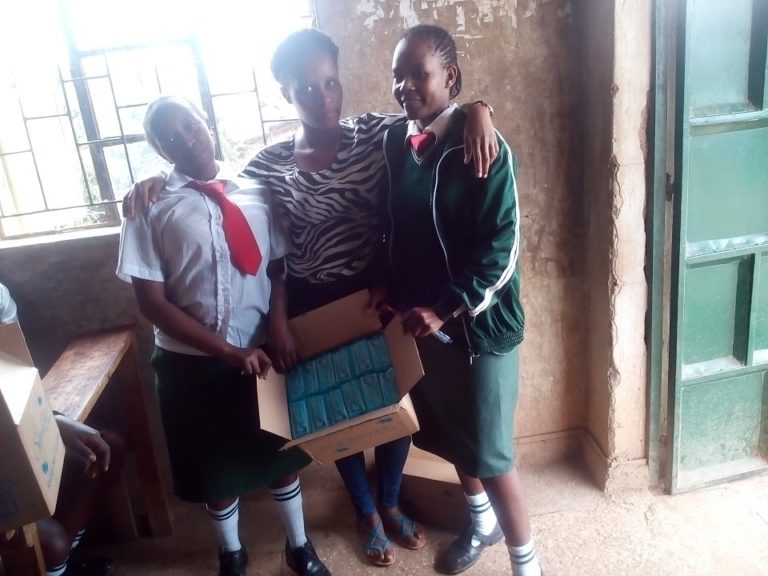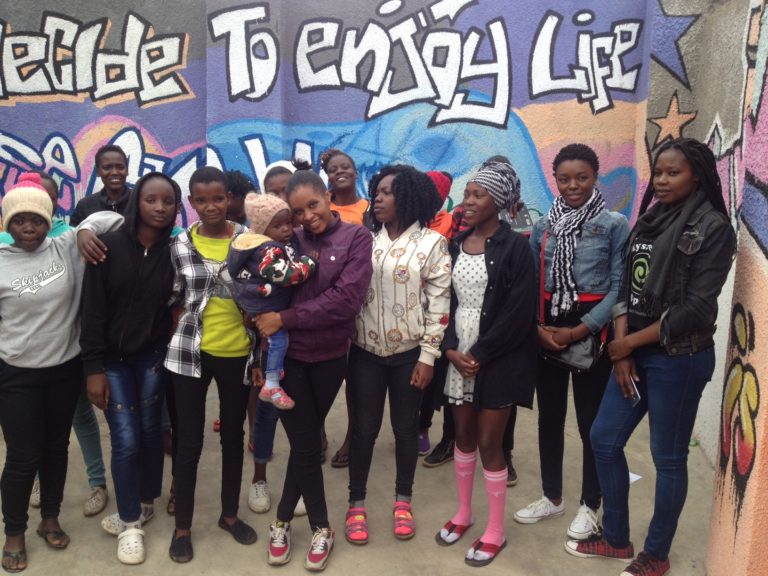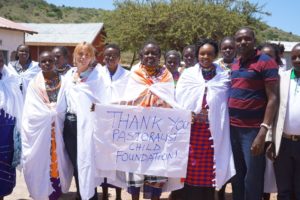My mother, a single mother to five children, gave birth to me when she was in Form One in High School. She had to breastfeed me for three months before she could go back and complete school. Then, I was left in the hands of my 60-year-old grandmother who was a farmer. In order to afford my school fees, my grandmother sold her farm produce. Life in high school was not easy. I could not afford to go shopping like my fellow schoolmates who came from wealthier backgrounds. However, I was not the only girl who suffered. I had one friend who struggled to afford sanitary towels. So, I would save the money I made from washing my neighbour’s clothes during the school holidays to buy her sanitary products.
After completing high school, I did not have money to further my education so I began to look for casual work to help support my siblings and grandmother. I continued to wash clothes for my neighbourhood for Ksh.500 per day. I would save this money and buy food for my family as well as my personal hygiene products.
Related Topics: Investing in Women and Tech – Investing in Women’s Reproductive Health – Female Genital Mutilation in Nigeria
At 19-years-old, I became pregnant. Initially, my family was unhappy about this, however, they supported me through my pregnancy. Three months and three days into my pregnancy I experienced troubling pain. I went for treatment where the doctor confirmed I had an ectopic pregnancy. The doctor questioned me on whether I had used any contraception. I had never even heard of contraception. I required urgent surgery because the fallopian tube had busted. After the surgery, the bill was far too great so I had to stay in the hospital for three weeks while my friends and family raised funds for the hospital bill.

NairoBits Trust
I had a difficult time getting any casual work after being discharged from the hospital. Finally, my friend told me about an NGO in Kibera, slum Nairobi. It was recruiting young girls and women for training in ICT skills. Without giving it much thought, I inquired for further details and interviewed. That is how I landed with the NairoBits Trust and was able to pursue my diploma in web and graphic design.
Beginning in 1999, the NairoBits Trust runs several programs. The NairoBits Trust is primarily concerned with providing quality education and skill development, especially regarding the use of ICTs, for youth in Kenya. Youths aged 14-25 make up approximately 20% of Kenya’s population. These programs range from ICT training, life skills, entrepreneurship, sexual reproductive health and rights and equal education skills for girls. NairoBits provided me with training in advocacy skills, sexual reproductive health and rights, and entrepreneurship skills. Specifically, NairoBits’ sexual reproductive health and rights (SRHR) program is concerned with ensuring quality SRHR services and resources, increasing and improving sex education, as well as accomplishing gender equality. Their entrepreneurship program trains students on ICTs skills and equips youth with training and resources needed to start a business or start-up. I am, and always have been, passionate about women’s empowerment and social enterprise, so I took advantage of these opportunities.
Editor’s Picks – Related Articles
Investing in Women’s Reproductive Health is an Investment for All
Pastoralist Child Foundation: Ending Gender-Based Violence in Kenya
Inclusion in ICT and Menstrual Hygiene Management Advocacy
In 2017, my classmates and I started advocacy and mentorship programs for high school girls and Kibera. We travelled to all-girls schools advocating for them to join tech-related careers. Sessions are held in high schools, and with my ICT skills, I also incorporate training on computational thinking, basic coding skills, gaming and robotics. We have trained 20 girls on basic coding skills. To coincide with these technical skills, we educate them on menstrual hygiene management and how to stand up for their values and rights as women in the community.
The inclusion of persons with disabilities is vitally important for menstrual hygiene management education and advocacy programs. I volunteered in a CBO, until today called Gifted community center as a program’s assistant. Here, I coordinated training for young women and youth with disabilities.

To further my impact, I studied sign language in order to include girls who are deaf, as they are normally left out in the training and advocacy programs. As this has allowed me to better communicate with them, I have realized their strength and perseverance as they pursue their careers.
It is also crucial to reach out to young mothers and youths. Specifically, I do this in Mathare slums Nairobi to train them on sexual reproductive health and rights (SRHR) skills. This includes information on HIV/AIDs, early pregnancies and contraception. I teach with great passion given my experiences of pregnancy. I regret not having the knowledge of contraception, even as basic as a condom. Young people in the slums are particularly vulnerable. Therefore, I urge them to make informed decisions.
For women to be able to stand up for their values and rights, every woman must be equipped with knowledge of menstrual hygiene management and safe sexual practices. In addition to being equipped with the skills needed to stand up for their rights, every woman should have the opportunity to be trained in technology, entrepreneurship and leadership skills to be empowered in their community. Knowing their sexual, reproductive and human rights is one stepping stone to empowering women in other sectors. I aspire for each woman to know their sexual and reproductive rights, to have the opportunity to achieve their full potential and to fully participate in all aspects of life. Everyone should have the opportunity to secure income.
Importance of Digital Literacy in Africa
1.2 of every 100 sub-Saharan Africans are digital illiterates. Many young and middle-aged women in Africa have no idea how the computer or the internet works. The world is fast transcending into a technology driven-one. There must be more opportunities for Africans to learn about digital technology, and to use these skills to advocate for their rights. Knowledge of digital technology is the first step to raising the next generation of female stakeholders in technology, leadership and entrepreneurship by training and empowering them through technology and innovation.
In the Cover Picture: Entangled red and white wires in the back of a computer. Photo Credit: Dirk.
Editor’s Note: The opinions expressed here by Impakter.com columnists are their own, not those of Impakter.com.












